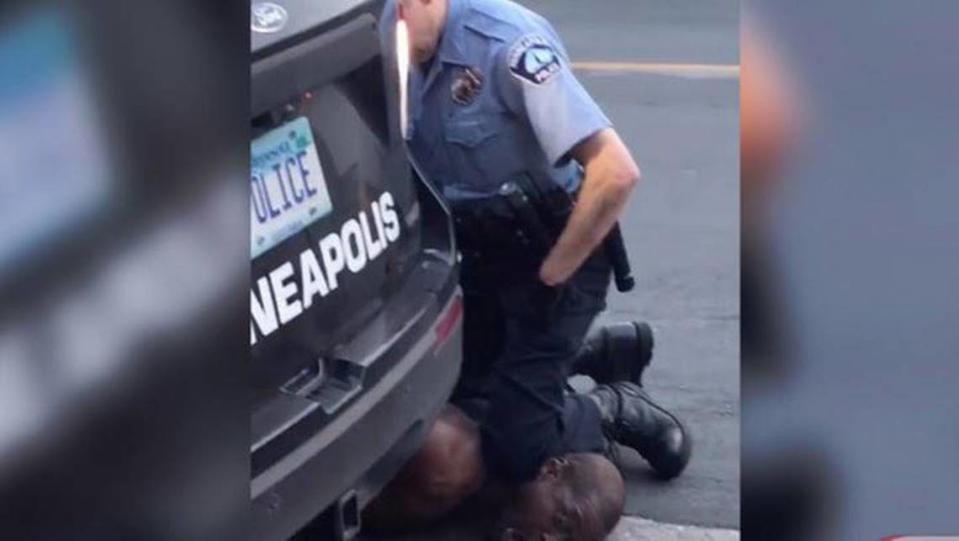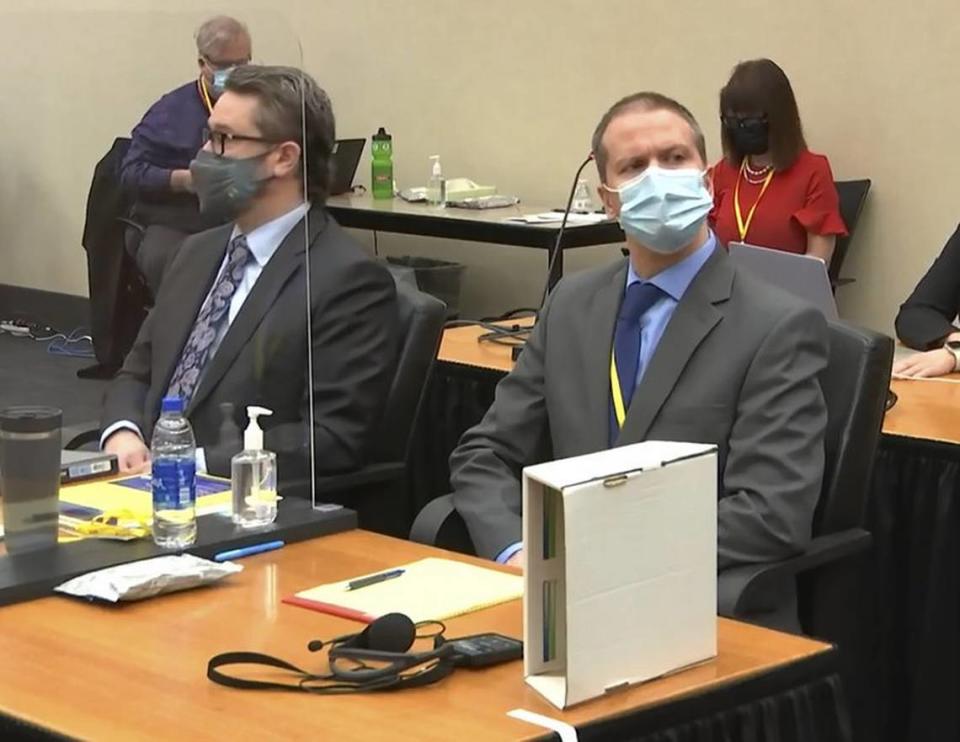‘Does it change anything?’ South Florida leaders react to Chauvin guilty verdicts
As a Minnesota judge read a jury’s verdicts against the former police officer accused of murdering George Floyd, Donald Graham, a federal judge in the Southern District of Florida, was speaking over Zoom to a group of Black students.
Graham told the students, who are enrolled in South Florida’s 5000 Role Models of Excellence program, what would happen next to the officer, Derek Chauvin.
“He goes to jail right now, he doesn’t await sentencing,” Graham said.
One of the students briefly unmuted to shout a single word: “Yes!”
Chauvin’s conviction Tuesday on counts of second-degree murder, third-degree murder and manslaughter led to similar sentiments among Black elected officials and community activists across the state.
“There are consequences,” said West Park Democratic Sen. Shevrin Jones, who helped organize protests after Floyd’s May 25 death. “No police officer should be allowed to kill and call it legal.”

But the real work is just beginning, said Tifanny Burks, a community organizer with Black Lives Matter Alliance Broward.
“Just because we got a guilty verdict for Chauvin doesn’t mean that police violence will stop or that white supremacy has ended,” Burks said. “We’re going to have to keep protesting no matter what.”
LaToya Ratlieff, who was peacefully protesting at a Floyd march in Fort Lauderdale last year when a police officer shot her in the face with a rubber bullet, said systemic reforms are still needed.
“Real justice is ensuring laws are enacted to make sure there isn’t a next George Floyd,” Ratlieff said in a statement. “Real justice means treating all lives as having equal value and protecting them from harm at the hands of those who we entrust with immense power.”
The damning piece of evidence against Chauvin was a bystander video that showed him kneeling on Floyd’s neck for nine minutes and 29 seconds as three other officers watched, even as Floyd begged for his life, saying “I can’t breathe.”
Floyd, 46, was handcuffed and face-down. A local medical examiner ruled his death a homicide. He had been accused of passing a counterfeit $20 bill at a convenience store.
Stephen Hunter Johnson, chairman of Miami-Dade’s Black Affairs Advisory Committee, said he feared Chauvin might have been acquitted had it not been for the video, shot by a 17-year-old witness.
“[Do] you have to get the entire crime on video in order to secure a conviction?” Johnson said.
And he pointed to the recent death of Daunte Wright, a 20-year-old Black man shot and killed by police during a traffic stop in Brooklyn Center, Minnesota, on April 11.
“Does it change anything?” Johnson said of the Chauvin verdict.
Daniella Pierre, president of Miami-Dade County’s NAACP branch, said she was relieved after decades of officers not being convicted for killing Black people.
“We were preparing for a verdict that none of us wanted to see,” Pierre said.
Rep. Frederica Wilson said the defining moment of the trial for her was when police officers took the stand for the prosecution against Chauvin.
“To watch the police officers dismantle the code of blue on the stand when they testified was earth-shattering to me,” WIlson said in an interview with the Herald. “I’m just hoping this is breaking down a barrier in modern policing when policemen are understanding that these are not caricatures of Black men. They are killing these people who have a heart, who have a family, who have a future and whose lives are not dispensable.”
She also said there’s been a sea change in the last decade in response to high-profile deaths at the hands of police. Trayvon Martin, a Miami Gardens resident and constituent of Wilson’s, was shot and killed by George Zimmerman in Central Florida. Wilson said the protests against Zimmerman, who was acquitted, were led and attended by mostly Black people, while she noticed the protests against Chauvin were the most diverse she’s ever seen.
“This is a great day for justice, it’s a great day for policing and it’s a great day for the Floyd family,” Wilson said.
Florida Republicans were more muted than Democrats in their reaction to the verdict.
Sen. Rick Scott said he wasn’t following the trial closely.
“Well I don’t know all the facts but everybody loses in these cases. You know I had the Trayvon Martin case,” Scott told reporters on Capitol Hill. “I think about the family and Floyd’s loss. But I believe in the judicial system and so both sides presented their case and [Chauvin] was convicted.”
Miami Mayor Francis Suarez called Tuesday a “reassuring day” for those who want to see the justice system work, even for police officers.
“While in our city we love our police officers, we support them and we always have their back, at the same time, in every profession there has to be accountability,” Suarez said.
Republican Reps. Mario Diaz-Balart and Carlos Gimenez, along with Republican Sen. Marco Rubio, did not immediately respond to requests for comment. Rep. María Elvira Salazar tweeted that “no man or woman is above the law.”
Acting U.S. Attorney for the Southern District of Florida Juan Antonio Gonzalez said in a statement: “While no verdict can bring Mr. Floyd back to his family, I pray that today’s decision brings them a measure of peace and all people a renewed faith in our justice system. As Attorney General Merrick Garland recently announced, the Department of Justice’s federal civil rights investigation into the death of George Floyd is ongoing.”
Gonzalez held a virtual town hall meeting with South Florida police, prosecutors and community leaders on Monday to discuss the Chauvin trial and police use of excessive force.
‘A powder keg’
Last year, Floyd’s death sent tens of thousands of Floridians into the streets to protest police brutality and racism.
Gov Ron DeSantis and Florida Republicans reacted by signing what they call an “anti-mob” bill to discourage violence at protests. Democrats say the bill, known as HB 1 and signed by DeSantis just a day before the Chauvin verdict, amounts to a suppression of civil rights. Because it is a felony statute, it can lead to protesters losing their right to vote.
Although Republican politicians criticized Black Lives Matter protests as violent and dangerous, particularly in the run-up to the 2020 election, 95% of BLM protests involved “no violent or destructive activity,” according to research by the U.S. Crisis Monitor project, which is affiliated with Princeton University.
Senate Criminal Justice Committee Chairman Jason Pizzo, D-Miami, said Tuesday that it was “indelicate, insensitive and stupid” of DeSantis to sign the bill when a verdict in the Chauvin trial was expected — and even more unwise that the law is going into effect immediately.
Most crime bills become effective later on, he said, to give law enforcement agencies the time to understand what the bill does.
“If it was a ‘not guilty’ or a conviction on a lesser charge, HB 1 could’ve been a powder keg because of the timing,” Pizzo said. “You need time for new laws to be promulgated and trickled down to departments. Some of the people who voted on the bill don’t even know what the hell is in it. ... Tell me how patrol officers are going to know what the new law is. The takeaway for the unsophisticated citizen is that you can run people over with your car.”
The first version of the bill, which DeSantis backed, would have expanded Florida’s Stand Your Ground law to justify use of force against protesters or others who loot businesses during a “riot.” That provision was removed.

On Tuesday night, Joseph Martinez, an organizer for Dream Defenders, a statewide group that seeks to abolish police and prisons, was canvassing and handing out information about HB 1 in Liberty City and Little Haiti.
He said he could have been arrested if the law was in effect last year.
“We have to be worried,” Martinez said. “I would be in prison right now for exercising my constitutional right.”
Still, activists said they wouldn’t let HB 1 deter them.
“The most sure tool we have to express frustration and demand accountability is protest, and it has been for centuries,” said Jasmen Rogers-Shaw, who helped organize protests in Broward County last summer. “We have always adapted to repression. We have always found a strategic way to make our voices heard.”
Miami Herald staff writers Ana Ceballos, Joey Flechas and Jay Weaver contributed to this report.

